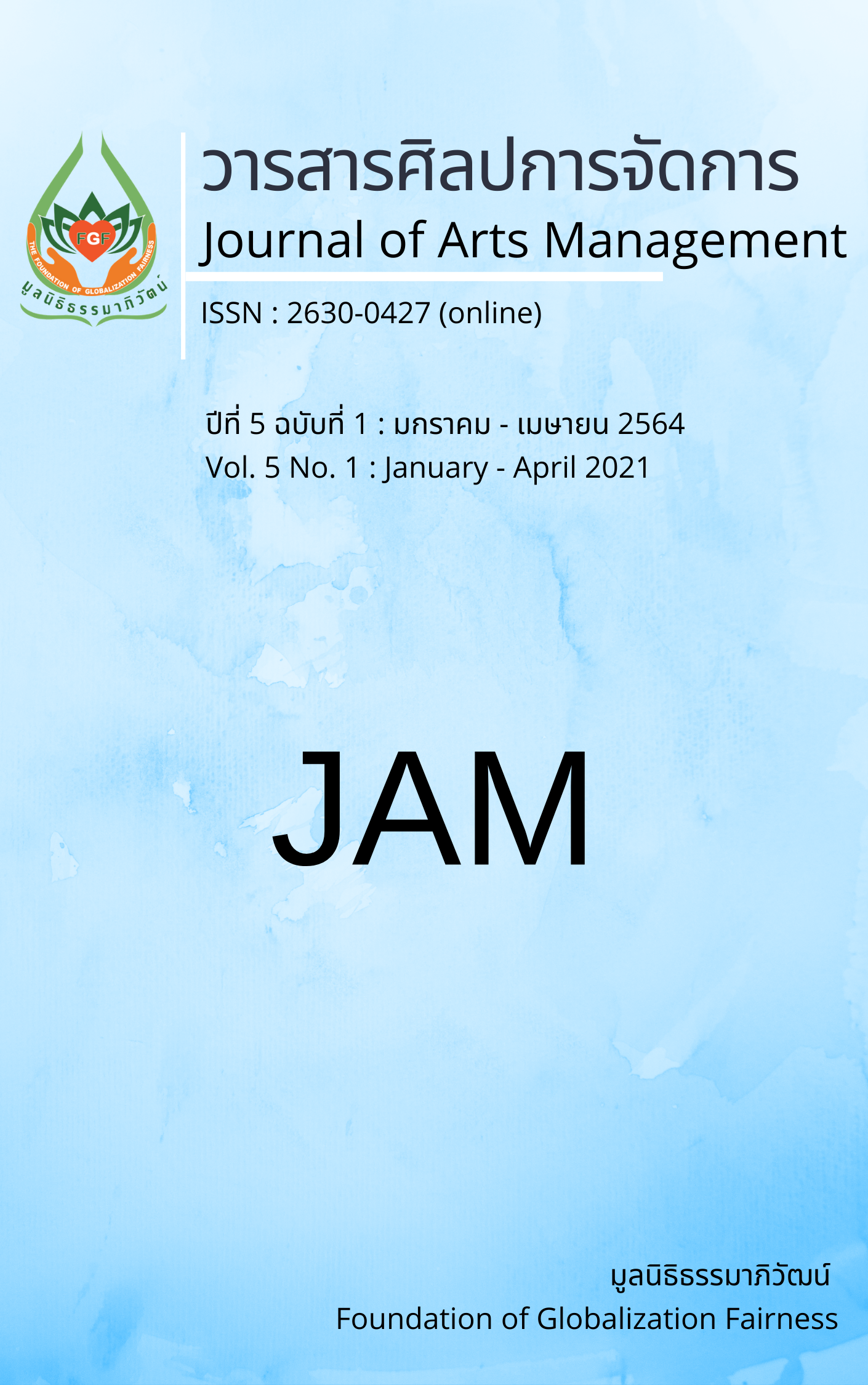Development of the use of Information technology in Education for Students in Early Childhood Education Program, Suan Sunandha Rajabhat University
Main Article Content
Abstract
The purposes of this study were as follows: (1) to examine the behavior of using information technology of the students in the early childhood education program, Suan Sunandha Rajabhat University; and (2) to develop the behavior of using information technology in education of the students in the early childhood education Program, Suan Sunandha Rajabhat University. A sample was selected from the students in early childhood education, Suan Sunandha Rajabhat University in 2018, 61 cases were included as a sample. They were selected by specific. Tools of data collection were analyzed using a questionnaire and an estimate. Analysis data by descriptive statistics percentage, mean, standard deviation and content analysis.
It was found that behavior of information technology in education of students in the Faculty of Education, Suan Sunandha Rajabhat University, Maximum number of respondents were as follows the subjects studied used information technology to study the classes. University e-learning is the place to use information technology to study the type of device using a notebook and the network usage 6-10 hours. 1) The use of information technology in education has a high level ( = 4.19), when considering each side, it was found that the highest level of behavior is the use of social media followed by the searching data and the presentation of information in a high level. The lowest level of behavior is digital learning when considering each item maximum behavior level consists the use of E-mail, Facebook, and Website was at the highest level and the lowest level, the presentation of the work using Flip Album was at a high level, and 2) development of the use of information technology in education. There are guidelines for development as follows: 1) educate students about the use of information technology in education; 2) practice in using information technology in education; 3) raise awareness of the advantages and limitations of using information technology in education; 4) control, track, guide, and enhance digital intelligence for students; and 5) assess the benefits of using information technology in education.
Article Details
Views and opinions appearing in articles in the Journal of Arts of Management It is the responsibility of the author of the article. and does not constitute the view and responsibility of the editorial team I agree that the article is copyright of the Arts and Management Journal.
References
กระทรวงเทคโนโลยีสารสนเทศและการสื่อสาร. (2554). กรอบนโยบายเทคโนโลยีสารสนเทศ พ.ศ. 2554-2563 ประเทศไทย. กรุงเทพฯ: กระทรวงเทคโนโลยีสารสนเทศและการสื่อสาร.
จิรศักดิ์ จันกัน. (2550). พฤติกรรมปัญหาการใช้อินเทอร์เน็ตของนักเรียนและนักศึกษาวิทยาลัยเทคนิคแพร่ (วิทยานิพนธ์ปริญญาครุศาสตรมหาบัณฑิต). มหาวิทยาลัยราชภัฏอุตรดิตถ์.
จุฑารัตน์ ช่างทอง. (2554). รูปแบบพฤติกรรมสารสนเทศของเยาวชนไทยจากการใช้ทฤษฎีฐานราก (วิทยานิพนธ์ปริญญาปรัชญาดุษฎีบัณฑิต). มหาวิทยาลัยขอนแก่น.
ฐิติยา เนตรวงษ์. (2547). การใช้สื่อเทคโนโลยีสารสนเทศทางการศึกษาเพื่อการเรียนรู้ด้วยตนเองของนักศึกษาคณะมนุษยศาสตร์และสังคมศาสตร์ สถาบันราชภัฏสวนดุสิต. กรุงเทพฯ: คณะมนุษยศาสตร์และสังคมศาสตร์, สถาบันราชภัฏสวนดุสิต.
ดวงกมล โพธิ์นาค. (2559). การศึกษาสภาพการใช้เทคโนโลยีสารสนเทศและการสื่อสารเพื่อสนับสนุนการเรียนรู้ของนักศึกษาระดับปริญญาตรี คณะครุศาสตร์อุตสาหกรรม มหาวิทยาลัยเทคโนโลยีพระจอมเกล้าพระนครเหนือ. วารสารมหาวิทยาลัยราชภัฏลำปาง, 5(2), 45-58.
นันทิยา น้อยจันทร์. (2560). ปัจจัยที่ส่งผลต่อคุณภาพบัณฑิตคณะครุศาสตร์ มหาวิทยาลัยราชภัฏสวนสุนันทา. กรุงเทพฯ: มหาวิทยาลัยราชภัฏสวนสุนันทา.
เมทณี ระดาบุตร, โสภาพันธ์ สะอาด, สุวลี มิลินทางกูร และสายหยุด พิลึก. (2554). สมรรถนะการใช้เทคโนโลยีสารสนเทศของนักศึกษาวิทยาลัยพยาบาล สังกัดสถาบันพระบรมราชชนกสังกัดกระทรวงสาธารณสุข. วารสารวิทยบริการ มหาวิทยาลัยสงขลานครินทร์, 22(1), 109-116.
ลาวัณย์ ค้าขาย. (2554). การใช้สารสนเทศเพื่อการศึกษาค้นคว้าของนักศึกษาระดับปริญญาตรี คณะ ครุศาสตร์อุตสาหกรรม มหาวิทยาลัยเทคโนโลยีพระจอมเกล้าพระนครเหนือ (วิทยานิพนธ์ศิลปศาสตรมหาบัณฑิต). มหาวิทยาลัยสุโขทัยธรรมาธิราช.
สนทยา สาลี. (2551). พฤติกรรมการใช้สารสนเทศของนักศึกษามหาวิทยาลัยราชภัฏพิบูลสงคราม (รายงานการวิจัย). พิษณุโลก: มหาวิทยาลัยราชภัฏพิบูลสงคราม.
สมคิด ดวงจักร์. (2551). ปัจจัยที่มีความสัมพันธ์กับการแสวงหาสารสนเทศของนักศึกษาระดับปริญญาตรี มหาวิทยาลัยราชภัฏหมู่บ้านจอมบึง (รายงานการวิจัย). ราชบุรี: คณะมนุษยศาสตร์และสังคมศาสตร์, มหาวิทยาลัยราชภัฏหมู่บ้านจอมบึง.
อิทธิพัทธ์ โยธะพันธ์. (2559). พฤติกรรมการใช้เทคโนโลยีสารสนเทศและความคาดหวังต่อการใช้เทคโนโลยีสารสนเทศของนิสิตคณะมนุษยศาสตร์และสังคมศาสตร์ มหาวิทยาลัยบูรพา (รายงานการวิจัย). สาขาเทคโนโลยีสารสนเทศและนิเทศศาสตร์. คณะมนุษยศาสตร์และสังคมศาสตร์. มหาวิทยาลัยบูรพา.
Anderson, J. (2010). ICT Transforming Education: A Regional Guide. Bangkok: UNESCO.
Cerretani, P. I., Iturrioz, E. B., & Garay, P. B. (2016). Use of information and communications technology, academic. Computers in Human Behavior, 56, 119-126. https://doi.org/10.1016/j.chb.2015.11.026
Cronbach, Lee J. (1973). Essentials of Psychological Testing. (3rd ed.). New York: Harper and Row.
Milošević, I., Živković, D., Manasijević, D., & Nikolić, D. (2015). The effects of the intended behavior of students in the use of M-learning. Computers in Human Behavior, 51, 207–215. https://doi.org/10.1016/j.chb.2015.04.041


